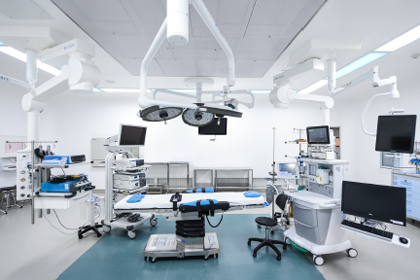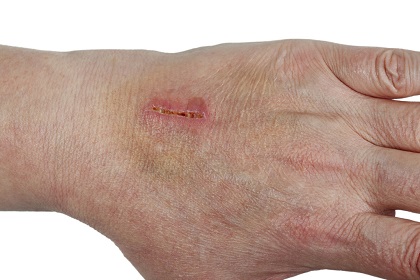Search
What do I need to know about an ileostomy diet?
You will need to make changes to the foods you eat for about 6 weeks after surgery. These changes will help your intestines heal and prevent problems that can occur when you have an ostomy. These problems include odor, gas, diarrhea, or obstruction (blockage in your intestines). After you heal, you can eat the foods you regularly ate before surgery.
What foods can I eat after surgery?
You will be given clear liquids right after surgery. Examples include clear juices, coffee or tea (with no cream or milk), gelatin, and broth. Next, you will be allowed to eat low-fiber foods. At first, you will need to limit fiber to less than 8 grams each day. As you heal and your symptoms decrease, you will limit fiber to less than 13 grams each day.
• Grains: Choose grains that have less than 2 grams of fiber in each serving. Examples include the following:
○ Cream of wheat and finely ground grits
○ Dry cereal made from rice
○ White bread, white pasta, and white rice
○ Crackers, bagels, and rolls made from white or refined flour
• Fruits and vegetables:
○ Canned and well-cooked fruit without skins or seeds, and juice without pulp
○ Ripe bananas and soft melon
○ Canned and well-cooked vegetables without skins or seeds, and strained vegetable juice
○ Potatoes without skin
○ Shredded lettuce on a sandwich
• Dairy:
○ Cow's milk, lactose-free milk, soy milk, and rice milk
○ Cottage cheese and yogurt without nuts, fruit, or granola
• Protein:
○ Eggs, fish, and tender, well-cooked poultry (such as chicken and turkey) and beef
○ Tofu and smooth peanut butter
What foods should I avoid after surgery?
Do not eat high-fiber foods right after surgery because they are harder to digest. Avoid foods that cause gas, odors, and diarrhea. Do not eat foods that may cause a blockage.
• Foods that are high in fiber:
○ Whole-grain foods such as whole-wheat breads, brown rice, or oats
○ Raw fruits and vegetables
○ Dried fruit
○ Dried beans
• Foods that may cause blockage:
○ Vegetable and fruit skins
○ Apples, dried fruit, grapes, coconut, and pineapple
○ Celery, corn, cucumber, green peppers, peas, and bean sprouts
○ Salad greens, cabbage, coleslaw, and spinach
○ Casing on sausage and tough, fibrous meats such as steaks
○ Nuts (such as almonds and pecans) and peanuts
• Foods that may cause gas or odor:
○ Apples, bananas, grapes, prunes, and melons
○ Asparagus, broccoli, brussels sprouts, cabbage, cauliflower, and corn
○ Onions, garlic, or leeks
○ Cucumber, green pepper, onions, radishes, and turnips
○ Alcohol
○ Cheese, peanuts, dried beans and peas, eggs, and fish
○ Carbonated drinks such as sodas
• Foods that may cause diarrhea:
○ Alcohol
○ Apricots, plums, peaches, prunes, and fresh or dried fruit
○ Fruit juice
○ Beans, fried meats, fish, poultry (chicken or turkey), nuts, or seeds
○ Broccoli, brussels sprouts, cabbage, corn peas, tomatoes, turnip greens, and green leafy vegetables
○ Bran, wheat, and other whole grains
○ Licorice and sugar-free substitutes
○ Spicy foods
○ Drinks with caffeine
○ Foods high in fat and sugar
What are some nutrition guidelines I should follow after surgery?
• Drink plenty of liquids as directed. Your dietitian or doctor may recommend that you have at least 8 to 10 eight-ounce cups of liquid each day. You may need more liquid if you sweat more than normal, such as after exercise. You may also need to drink more if there is a large amount of liquid coming out of your stoma (opening). Ask which liquids are best for you. You may need to drink an oral rehydration solution (ORS). An ORS has the right amounts of sugar, salt, and minerals in water to replace body fluids. Drink liquids 30 minutes after you eat instead of with meals. This will help your body to absorb more nutrients from food
• Take small bites of food and chew them well. This will allow your body to better digest and absorb nutrients. This will also help to prevent a blockage and decrease gas
• Eat small amounts of food every 2 to 4 hours. Your appetite may be lower than normal right after surgery. Eat regularly throughout the day to get enough nutrients. Regular meals and snacks will also help decrease gas. Do not lie down within 1 hour after you eat
• Eat your full meals in the middle of the day. This will decrease the amount of bowel movement that comes from your stoma at night
• Avoid acidic, spicy, high-sugar, and high-fat foods. These foods can cause diarrhea. Acidic foods include citrus fruits such as oranges
• Avoid chewing gum, drinking with straws, smoking, and chewing tobacco. This will help to decrease gas
• Take vitamin or mineral supplements as directed. Chewable or liquid forms are the best types. You will need vitamin B12 supplements in the form of a nasal spray or injection. Your body will absorb vitamin B12 better if it is given as a nasal spray or injection
When should I contact my doctor?
• You are urinating less than usual or your urine is dark
• You feel dizzy when you stand
• You feel extremely tired
• You have nausea, and you are vomiting
• You have not had any bowel movement come out of your stoma for 4 to 6 hours
• You have abdominal cramps that last more than 2 or 3 hours
• You see pills or whole foods in your ostomy bag
• You have questions or concerns about your condition or care
CARE AGREEMENT:
You have the right to help plan your care. Discuss treatment options with your caregivers to decide what care you want to receive. You always have the right to refuse treatment.
© 2017 Truven Health Analytics LLC All illustrations and images included in CareNotes® are the copyrighted property of A.D.A.M., Inc. or Truven Health Analytics.
Click the link for more information on Nutrition Health Service
Click the link for more information on General Surgery Clinical Service











